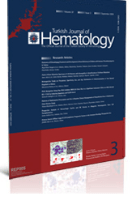
Turkish Journal of Hematology
Scope & Guideline
Unveiling the latest breakthroughs in blood health and treatment.
Introduction
Aims and Scopes
- Clinical Research in Hematological Malignancies:
The journal consistently publishes studies addressing various aspects of hematological malignancies, including clinical outcomes, treatment regimens, and patient management strategies. - Genetic and Molecular Insights:
Research exploring genetic mutations, molecular pathways, and their implications in blood disorders is a core focus, contributing to the understanding of disease mechanisms and potential targeted therapies. - Transfusion Medicine and Hematopoietic Stem Cell Transplantation:
The journal highlights advancements in transfusion practices, stem cell transplantation techniques, and post-transplant care, emphasizing their implications for patient outcomes. - Autoimmune and Inflammatory Disorders:
Papers discussing the relationship between hematological conditions and autoimmune disorders, as well as the management of related complications, are frequently featured. - Epidemiological Studies and Public Health:
The journal includes studies on the epidemiology of hematological disorders, aiming to inform public health strategies and improve patient care in diverse populations.
Trending and Emerging
- Novel Therapeutic Approaches in Hematological Malignancies:
There is an increasing trend towards studies exploring novel therapies, including targeted treatments and immunotherapies, particularly in acute leukemias and lymphomas. - Integration of Precision Medicine:
Research focusing on precision medicine, including the use of genetic and molecular profiling to tailor treatments for individual patients, is gaining prominence. - Impact of COVID-19 on Hematological Patients:
The journal has increasingly published studies examining the effects of COVID-19 on patients with hematological conditions, highlighting the pandemic's impact on treatment and outcomes. - Long-term Follow-up Studies:
Emerging themes include long-term follow-up studies assessing late effects of treatments in hematological malignancies, particularly in pediatric populations. - Collaborative Multicenter Studies:
There is a growing trend towards multicenter studies that enhance the robustness of data and facilitate broader insights into treatment outcomes and disease characteristics.
Declining or Waning
- Traditional Cytogenetic Techniques:
There has been a noticeable decline in studies emphasizing traditional cytogenetic techniques in favor of advanced molecular diagnostics and genetic profiling, which are becoming more standard. - Non-specific Hematological Conditions:
Research on non-specific or less prevalent hematological conditions appears to be waning, as the journal shifts towards more prevalent and impactful diseases such as leukemias and lymphomas. - Generalized Reviews without Novel Insights:
The journal has moved away from publishing broad review articles that lack novel insights or findings, focusing instead on original research that offers new data and conclusions.
Similar Journals

INTERNATIONAL JOURNAL OF HEMATOLOGY
Delivering Cutting-Edge Findings in HematologyThe INTERNATIONAL JOURNAL OF HEMATOLOGY, published by SPRINGER JAPAN KK, serves as a critical platform for advancing research in the field of hematology. With a prestigious history spanning over three decades from 1991 to 2024, this journal is recognized for its impactful contributions, evidenced by its Q2 category ranking in Hematology for 2023, and its notable position at rank #71 out of 137 in the Scopus Medicine Hematology category. Researchers and professionals within the hematology community benefit from the journal's rigorous peer-reviewed articles that cover a wide range of topics, including clinical studies, basic research, and novel therapeutic strategies. Though currently non-open access, it provides essential insights and findings to an audience passionate about the latest advancements in blood disorders and treatments. Situated in Japan, the journal not only showcases high-quality research but also fosters a global exchange of knowledge in hematology, making it a significant resource for scholars, practitioners, and students alike.

Hematologie
Exploring Innovations in HematologyHematologie is a highly regarded journal in the field of hematology, published by JOHN LIBBEY EUROTEXT LTD. With an ISSN of 1264-7527 and an E-ISSN of 1950-6368, this journal has established itself as a vital resource for researchers, clinicians, and students dedicated to advancing the understanding of blood disorders and treatments. Although the journal's coverage in Scopus was discontinued in 2018, it has continually provided invaluable insights and research findings. The journal aims to foster knowledge sharing and discussion in hematology, exploring innovative methodologies and emerging trends in the field. With a commitment to quality research, Hematologie remains an essential platform for disseminating critical findings that can drive clinical practice and influence future studies in hematological sciences.
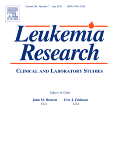
LEUKEMIA RESEARCH
Exploring breakthroughs in hematology and oncology.Leukemia Research is a prominent academic journal dedicated to advancing the field of hematology and oncology, focusing on the latest research developments related to leukemia and other hematological disorders. Founded in 1977 and published by Pergamon-Elsevier Science Ltd in the United Kingdom, this esteemed journal has established itself as a vital resource for researchers and clinicians alike. With an impressive impact factor and categorized in the top quartiles of Cancer Research and Hematology, it provides a platform for high-quality research articles, reviews, and clinical studies that contribute to a deeper understanding of leukemia's complexities. Although not an Open Access journal, Leukemia Research ensures widespread dissemination of knowledge crucial for developing innovative treatment strategies and improving patient outcomes. Researchers, professionals, and students in the fields of hematology and oncology will find this journal an invaluable asset in staying at the forefront of leukemia research, as it prepares to expand its impact through converged years of publication extending into 2024.

Indian Journal of Hematology and Blood Transfusion
Pioneering Research in Hematology for Tomorrow's HealthcareIndian Journal of Hematology and Blood Transfusion, published by SPRINGER INDIA, serves as a leading platform for disseminating original research, reviews, and case studies in the field of hematology. With an ISSN of 0971-4502 and E-ISSN 0974-0449, this journal has been instrumental in advancing knowledge from 2000 to 2024, providing insights into critical issues surrounding blood disorders and transfusion practices. Currently ranked in the Q3 category for Hematology for 2023, it reflects a commitment to high-quality scientific content amidst a competitive landscape where it ranks 97/137 in Scopus for Medicine - Hematology, placing it in the 29th percentile of its peers. The journal primarily addresses a diverse readership, including researchers, healthcare professionals, and students, aiming to foster innovation and collaboration within the field. Although it operates under a subscription model, access options for individual articles and institutional subscriptions ensure that valuable research is disseminated widely to enhance medical practice and education in hematology.
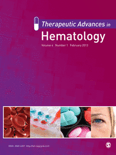
Therapeutic Advances in Hematology
Transforming research into impactful therapies.Therapeutic Advances in Hematology is a prestigious, peer-reviewed journal dedicated to advancing the field of hematology through innovative research and clinical studies. Published by SAGE Publications Ltd, this journal has become a vital resource for hematology professionals and researchers since its inception in 2010. With its impactful Q1 ranking in Hematology and a Scopus rank of 62 out of 137, it firmly establishes itself as a leader in disseminating significant findings and therapeutic approaches. The journal has been committed to open access since 2019, ensuring that its cutting-edge research is readily available to the global scientific community. Covering a broad scope of topics within hematology, Therapeutic Advances in Hematology is an essential platform for those seeking to enhance their understanding and implementation of therapeutic practices in hematological conditions. The journal embraces submissions from both clinical and laboratory perspectives, fostering collaboration and dialogue among researchers, clinicians, and students alike.

ANNALS OF HEMATOLOGY
Connecting researchers and clinicians for a healthier tomorrow.ANNALS OF HEMATOLOGY, published by Springer in Germany, stands as a premier platform for advancing knowledge in the field of hematology and medicine at large. With a significant impact factor and recognized rankings—Q2 in Hematology and Q1 in Medicine (miscellaneous) as of 2023—this journal is pivotal for researchers, clinicians, and students who are keen on exploring the latest developments in blood disorders, treatments, and innovative methodologies. Its broad scope encompasses original research, reviews, and discussions that aim to foster interdisciplinary dialogue, ensuring that the latest findings and theories are accessible to the scientific community. Although not an open-access journal, its rigorous peer-review process guarantees high-quality contributions, thereby solidifying its reputation as a vital resource in the hematological field. Founded in 1991, the ANNALS OF HEMATOLOGY continues to evolve, converging invaluable insights from both basic and clinical research until 2024. For those dedicated to improving patient outcomes and advancing hematological science, this journal remains an essential reference.
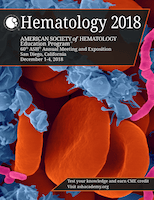
Hematology-American Society of Hematology Education Program
Empowering Knowledge in Blood DisordersHematology-American Society of Hematology Education Program is a premier peer-reviewed journal dedicated to advancing the field of hematology through comprehensive educational content. Published by the American Society of Hematology, this journal plays a crucial role in disseminating knowledge to researchers, clinicians, and students in hematology and related disciplines. With an impressive Q1 status in the field, it ranks among the top journals at the forefront of hematological research, as evidenced by its 60th percentile ranking in Scopus' Medicine - Hematology category. Although it does not offer open access, the journal provides invaluable insights and educational resources from leading experts, focusing on the latest advancements, treatment protocols, and evolving understanding of blood disorders. Covering a wide range of topics, from basic research to clinical applications, this journal is essential for anyone seeking to deepen their expertise and stay informed on the latest developments in hematology. For further engagement, readers can access insightful articles published since 2001, ensuring a rich repository of knowledge for ongoing research and clinical excellence.

HemaSphere
Exploring the frontiers of hematology research.HemaSphere, published by WILEY, stands at the forefront of hematology research, offering a vital platform for the dissemination of cutting-edge findings in the field. Since its inception in 2017 and official transition to Open Access in 2018, the journal has positioned itself as a leading conduit for high-impact research, maintaining a prestigious Q1 quartile ranking in the Hematology category as of 2023. Addressed in the United States at 111 River St, Hoboken, NJ, HemaSphere aims to foster a global dialogue among researchers, clinicians, and students by providing unrestricted access to high-quality content that encompasses clinical and experimental advancements. With an array of engaging articles, reviews, and commentaries, HemaSphere contributes significantly to the advancement of hematology, ensuring that critical knowledge is readily accessible to enhance patient care and innovative research. To explore the latest developments and breakthroughs in this dynamic field, we invite scholars, professionals, and students to engage with HemaSphere and elevate their understanding of hematologic science.
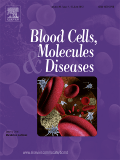
BLOOD CELLS MOLECULES AND DISEASES
Bridging Research and Clinical Insights in HematologyBLOOD CELLS MOLECULES AND DISEASES is a prominent multidisciplinary journal published by Academic Press Inc., Elsevier Science, specializing in the fields of hematology, molecular biology, and cell biology. With an ISSN of 1079-9796 and an E-ISSN of 1096-0961, this journal serves as a vital resource for researchers, professionals, and students exploring the complex interplay between blood cells and their corresponding molecular pathways in disease states. Spanning topics from cellular mechanisms to therapeutic advancements, BLOOD CELLS MOLECULES AND DISEASES holds a commendable reputation with a 2023 category quartile ranking of Q2 in Hematology and Q3 in several related fields. This journal not only provides a platform for the dissemination of innovative research but also fosters collaboration and knowledge exchange within the scientific community. As it converges from 1995 to 2025, the journal continues to impact the medical and biological sciences significantly, making it an essential tool for advancing our understanding of hematologic diseases.

Journal of Hematology
Pioneering Discoveries in Blood HealthThe Journal of Hematology, published by ELMER PRESS INC, serves as a pivotal platform for disseminating cutting-edge research in the field of hematology. With an ISSN of 1927-1212 and an E-ISSN of 1927-1220, this journal is committed to advancing scientific knowledge and clinical practice through high-quality peer-reviewed articles encompassing all aspects of blood disorders, from basic science to health policy implications. While the journal currently operates under a traditional access model, it nonetheless prioritizes the rapid publication of significant findings, ensuring that researchers, clinicians, and students have timely access to the latest advancements in hematological research. Positioned to bridge gaps in knowledge and foster collaboration among scholars worldwide, the Journal of Hematology is an essential resource for anyone invested in this vital area of medicine.